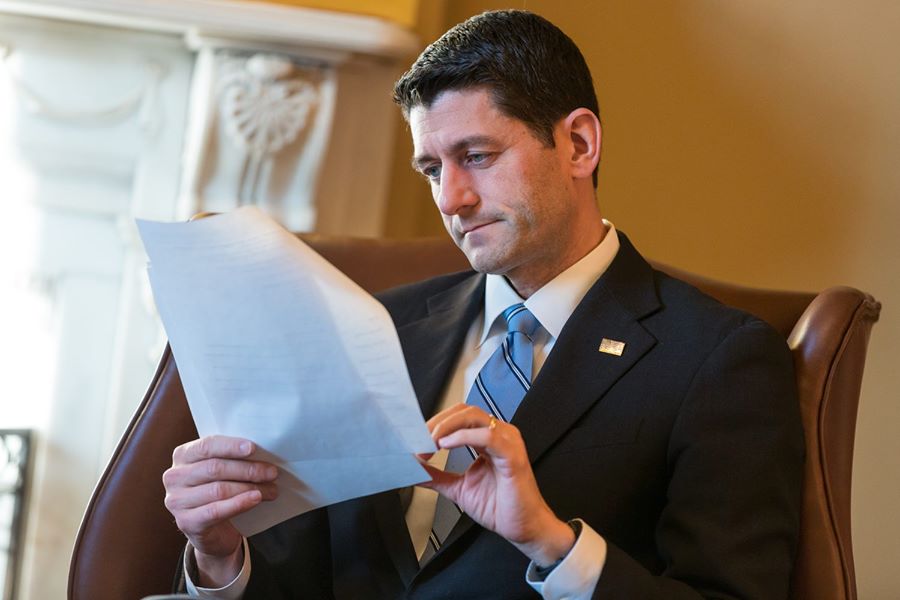
U.S. House of Representatives
Speaker Paul Ryan's poverty plan, as well as many similar GOP proposals, is doomed to failure because of reliance on discredited, right-wing lies about poverty.
On February 4, the most liberal cable TV network—by far—MSNBC, hosted a debate between the two most liberal candidates—by far—Hillary Clinton and Bernie Sanders. Even though most Americans live in or near cities, not a single debate question was asked about public transportation or affordable housing.
Even though 48 million Americans live in poverty, and an equal number struggle against hunger, while more than half a million are homeless, not a single question was asked by moderators Rachel Maddow or Chuck Todd about homelessness, hunger, or poverty.
Moreover, over the last three presidential election cycles, covering the last 12 years, as far as I could determine, not one – not one – media question put to candidates was about one of those issues, even though the number of Americans in poverty is larger than the populations of California and Virginia combined.

No Backspace is City Limits' new blog featuring a recurring cast of opinion writers passionate about New York people, policies and politics.
Ironically, in 2012, the main mention of poverty-related issues came when, in each of the three general election debates, Romney attacked Obama on the supposedly high national rates of food-stamp (SNAP) participation. Even though Obama was the first president to have grown up in a family that received food stamps (his mother used them while she attended nursing school), the president went out of his way to avoid responding to the attacks, instead changing the subject.
The conventional wisdom – that if Democrats so much as mention poverty they will scare away middle-class voters – is, how shall I put this, nonsense. Middle-class voters are scared to death of falling into poverty, and rightfully so, since statistics prove that they often do. Moreover, it is a truism in all other aspects of politics that it is a deadly mistake to allow your opponents to define any critical issues. Of course, if the only argument the public hears is right-wing trope that social programs are all waste-laden, fraud-ridden, work-avoiding, hand-outs to non-white people, they will believe that. The Democrats fail to see that they can’t win an argument that they are unwilling to have. When attacked by Romney, what Obama should have said was: “Governor, conservative policies such as yours wrecked our economy and caused a massive increase in hunger. How dare you complain that we are giving food life preservers to those who are drowning?”
The avoidance continues. I just received a questionnaire from the DNC that was little more than a fundraising ploy. Recipients of the mailing were given 10 potential choices to check off as issues important to them, but not one of them so much as mentioned any poverty- or inequality-related item.
While Clinton and Sanders have talked a bit more about poverty in this year’s campaign than have previous candidates, neither has yet issued a detailed anti-poverty plan.
And what about the Republicans? While their actual debates haven’t addressed poverty, most of the top candidates, other than Trump and Cruz, did attend a forum on “Expanding Opportunity” (political-speak for reducing poverty) hosted by House Speaker Paul Ryan. Virtually all the attendees opposed raising the federal minimum wage and blamed poverty on anti-poverty programs.
Paul Ryan is now the leading public figure, of either party, proposing supposed solutions to poverty, but he has a giant credibility problem. Ryan has spent much of his career trying to take food, housing, and health care away from poor people. So when he offers what he claims is a comprehensive plan to reduce poverty in America, progressive advocates such as myself can be forgiven if we take his proposals with a grain of salt. In fact, we take them with a few Great Salt Lakes’ worth of salt. After all, his anti-poverty plans to date have been only slightly more helpful than Colonel Sanders’ promised “retirement plans” for chickens.
But even as we rightfully point out Ryan’s flaws as a messenger, it is vital that we seriously examine the substance of his message. He has taken the time to produce a 73-page report on opportunity and poverty. Any leading political and governmental figure who claims to offer a substantive plan to address poverty deserves a serious hearing and a serious response. So, let’s take a look.
Ryan’s plan includes a few positive proposals, such as expanding the federal Earned Income Tax Credit (EITC) – which now gives tax refunds to low-income workers, mostly those with children – to include more childless wage-earners. He has also proposed enabling workers to get their portion of EITC payments with each paycheck, instead of just once a year. Those are not new ideas, but they are good ones, and they should receive bipartisan support. But because Ryan and his GOP colleagues refuse to even consider requiring wealthy Americans to again pay their fair share in taxes, and because he has pledged that his anti-poverty proposal won’t add a penny to the federal deficit, he has proposed to pay for the EITC expansion by eliminating some existing low-income programs of proven effectiveness. One of the programs on Ryan’s chopping block is the USDA Farmers’ Market Nutrition Program, which helps low-income women who are pregnant or who have small children obtain fresh produce at farmers’ markets. Yes, Ryan would rather harm small farmers and literally take fresh, healthy food away from pregnant moms than require billionaires to pay a few more dollars in taxes.
The centerpiece of the Ryan plan, like many conservative plans, is eliminating the right of individuals to receive SNAP (formerly food stamps benefits), as a guaranteed entitlement if their income is low enough, and instead block grant the program to states, allowing them to determine who does, and does not, get nutrition assistance. Ryan claims that his proposal wouldn’t result in cuts in benefits, but the way his plan is structured, it would be virtually guaranteed, over time, to provide less help to families in need.
Moreover, the entire Ryan poverty plan, as well as many similar GOP proposals, is doomed to failure because of reliance on discredited, right-wing lies about poverty. Ryan says over and over again that the federal “War on Poverty” failed, even though between 1960 and 1973, due to both broad-based economic growth and increased social-service spending, the U.S. poverty rate was cut in half and 16 million Americans climbed out of poverty and into the middle class.
Ryan and the rest of the Right wants us to believe that states wear halos, but, as corrupt as Washington, D.C., is these days, many state capitols, including Albany, are even more crooked. So many state officials have been convicted of felonies that prisons could field football teams made up of former public officials: Imagine the Attica Assemblymen versus the Joliet Govs.
Plus, there is not one iota of hard evidence that state governments, in aggregate, manage anti-poverty programs – or any other programs – more effectively than the federal government. If you are a low-income person living in South Central Los Angeles, a state government program manager in Sacramento (a five-hour drive away) is no more – or less – likely to understand your needs than a federal government program manager in Washington, DC (a five-hour flight away).
The Ryan plan is also predicated on the myth that most poverty is generational, long-term, and somehow the fault of poor people. Most U.S. families who experience poverty do so sporadically, repeatedly climbing into, and then falling out of, the middle class due to economic forces beyond their control and plain ‘ole bad luck. The stints are often brief: The average length of time most families spend in poverty is now six months – far too long, but hardly a lifetime.
The Ryan plan claims that people in generational poverty lack “parenting skills” and “productive habits,” yet it cites no data that low-income people are worse parents or lazier than are wealthy Americans. If anyone doubts that wealthy people can also be fundamentally irresponsible, I have eight words for you: Lindsey Lohan, Charlie Sheen, Justin Beiber, and Dennis Rodman. (Oh, let me throw in four more words: Robert Durst and Bernie Madoff.) The Ryan report also says individuals in poverty are “at risk of return to substance abuse,” as if it is self-evident that all people in long-term poverty previously engaged in substance abuse. (Did I mention Courtney Love?). In fact, when a few states wasted millions of dollars and violated the Bill of Rights in order to drug-test welfare recipients, it turned out that people receiving public assistance actually used drugs at a rate lower than the population as a whole.
Ryan proposes many restrictions on the lives of low-income Americans. Conservatives proclaim that they don’t want government on their own backs, or on the backs of giant corporations, but when it comes to people living in poverty, they want government on their backs, fronts, tops and bottoms.
The liberal desire to give down-and-out families a few more crumbs is certainly more laudable than the conservative desire to take away even the tiniest crumbs, but low-income Americans deserve a full loaf. The time is long overdue for our presidential campaigns to include robust, honest discussions of how low-income Americans can finally get their fair piece of the pie.








